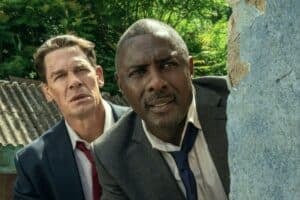Pride isn’t exactly a blockbuster in terms of production, but it’s a hit nonetheless.

It works because it tells a genuine story about unity across class, culture, gender and sexual orientation.
It has heart in all the right places and sufficient humour to keep it upbeat, without trivialising its main focus.
Based on a true story, the film depicts the struggle of a group of striking miners in 1984 and an unlikely union formed with a group of out-and-proud homosexuals.
Insisting anyone threatened by Prime Minister Margaret Thatcher is a comrade-in-arms, Mark Ashton (Ben Schnetzer) notes parallels between the marginalised miners and the oppression felt by homosexuals at the time.
He forms the Lesbians and Gays Support the Miners (LGSM) group and launches a campaign involving a couple of young London based city slickers raising money to help out the families affected by the strike.
This includes 30-year-old Joe (George MacKay), who is on the brink of coming out but not quite brave enough to tell his conservative folks.
Director Matthew Warchus does well to capture the contrasts between the miners and activists, who to all intents and purposes appear to inhabit two completely different worlds – from stout macho miners to ostentatious gays (the common ground being a shared hard-headedness.
Dominic West puts in a notable performance in the role of the flamboyant Jonathan Blake, thought to be the second man to be infected with HIV in Britain and who is still alive.
What the activists didn’t anticipate, however, was the miners’ reluctance to accept the group’s support, based on their sexual orientation.
Not easily dissuaded, LGSM decide to take their donations directly to Onllwyn, a small mining village in Wales.
Here, they are faced by a small homophobic Welsh village, melting the gay’s generous spirits.
But as director Warchus puts it, “prejudice cannot survive proximity” – and all animosity evaporates as soon as they get to know each other, forming an unlikely friendship and standing in solidarity against the injustices they face.
Though the miners’ did not actually win their battle, conceding after a year of protests, the film’s focus remains fixed on the pride felt by both parties in standing up for what they believe in, despite their brusied egos.
This is a feel-good movie that makes you want to stand up and do the right thing.
Though everything has changed in the 30 years since then – the coal mines are gone, same-sex marriage is now lawful in the UK – one cannot deny gay persecution remains rife worldwide.
Pride says a lot about how far we’ve come as a society – and how far we still need to go. Films like these are needed to change people’s hearts and minds
Support Local Journalism
Add The Citizen as a Preferred Source on Google and follow us on Google News to see more of our trusted reporting in Google News and Top Stories.






